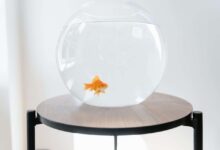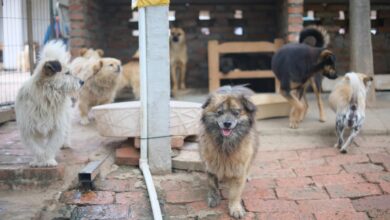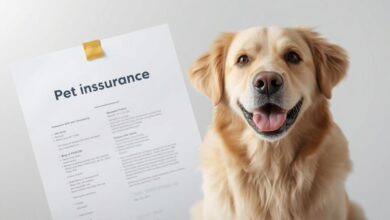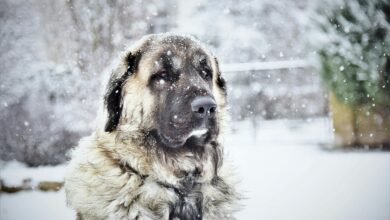Cane Corso 101: A Comprehensive Breed Guide
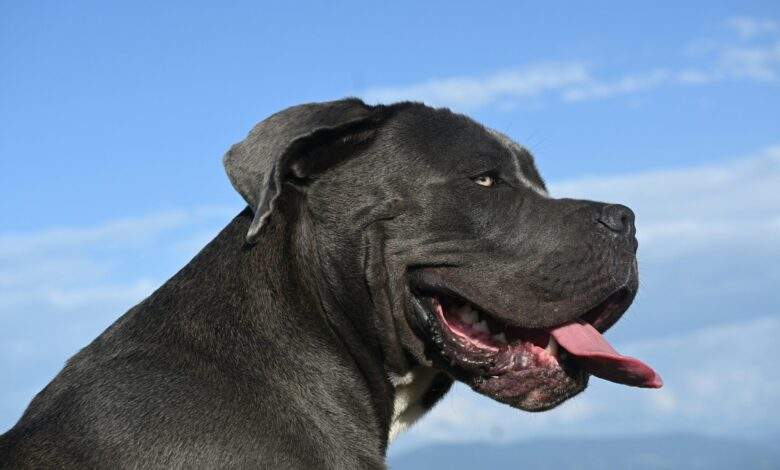
Embark on a Journey with the Majestic Cane Corso
Are you intrigued by the allure of a loyal, intelligent, and powerfully built canine companion? Look no further than the Cane Corso. This ancient Italian breed, with its rich history and striking appearance, has captured the hearts of dog enthusiasts worldwide.
In this comprehensive guide, we’ll delve into the fascinating world of the Cane Corso. We’ll explore their origins, their physical attributes, and their unique temperament. You’ll learn about their training needs, their dietary requirements, and their grooming needs. We’ll also discuss common health issues and how to prevent them.
Whether you’re considering adding a Cane Corso to your family or simply curious about this magnificent breed, this guide will provide you with all the information you need to make informed decisions and ensure a harmonious relationship with your canine companion.
So, let’s embark on this journey together and uncover the secrets of the Cane Corso.
Table of contents
- Embark on a Journey with the Majestic Cane Corso
- 1. Cane Corso Breed Overview
- 2. The History of the Cane Corso
- 3. Understanding the Cane Corso Breed Standard
- 4. Physical Appearance and Size
- 5. Cane Corso Temperament and Personality
- 6. Cane Corso Intelligence and Trainability
- 7. Energy Levels and Exercise Needs
- 8. Socialization Tips for Cane Corso Owners
- 9. Nutrition and Dietary Requirements
- 10. Grooming and Maintenance
- 11. Health and Lifespan of the Cane Corso
- 12. Frequently Asked Questions About Cane Corsos
- 1. Are Cane Corsos good family dogs?
- 2. How big do Cane Corsos get?
- 3. What is the Cane Corso’s temperament like?
- 4. How much exercise does a Cane Corso need?
- 5. How often should I groom my Cane Corso?
- 6. Are Cane Corsos prone to any specific health problems?
- 7. How long is the lifespan of a Cane Corso?
- 8. Are Cane Corsos good with other pets?
- 9. How much does a Cane Corso puppy cost?
- 10. What is the best way to train a Cane Corso?
- 13. Conclusion: Is the Cane Corso Right for You?
1. Cane Corso Breed Overview
The Cane Corso, a breed of the Italian Mastiff family, is highly prized for its protective instincts, loyalty, and intelligence. Known for its intimidating size and athletic build, the Cane Corso is a natural guardian and works well in various roles from family protection to farm work.
Breed Quick Facts
- Height: 23.5 to 27.5 inches
- Weight: 90 to 120 pounds
- Coat: Short, dense, and water-resistant
- Lifespan: 10 to 12 years
Fun Fact
The word “Cane” means dog in Italian, while “Corso” translates to “guardian.” True to its name, the Cane Corso has a natural instinct to protect its family and territory.
2. The History of the Cane Corso
Origins and Purpose
The Cane Corso’s roots trace back to ancient Rome, where they were bred from the larger Roman war dogs to create a versatile protector capable of hunting, herding, and guarding. They eventually transitioned from battlefields to farms, where they were used to protect livestock and hunt large game, such as wild boar.
Breed Decline and Revival
After World War II, the Cane Corso population dwindled, and the breed was nearly extinct. Dedicated enthusiasts helped revive the breed in the 1970s, restoring its popularity and preserving its unique characteristics.
Resource: For a detailed history, visit the Cane Corso Association of America.
3. Understanding the Cane Corso Breed Standard
Breed standards outline the ideal physical and behavioral characteristics of the Cane Corso, as specified by organizations like the American Kennel Club (AKC).
- Head: Large and blocky with a strong, broad jaw.
- Body: Muscular and well-proportioned, showcasing both strength and agility.
- Eyes: Almond-shaped and usually dark, giving the Cane Corso an intelligent and alert expression.
Understanding breed standards is important for those interested in showing their Cane Corso or assessing the breed quality.
4. Physical Appearance and Size
The Cane Corso is a large, muscular dog with an athletic build. Its size can be intimidating, but it also reflects the dog’s strength and agility.
Tips for New Owners
- Space Requirements: Due to their size, Cane Corsos are best suited for homes with ample space, preferably with a secure yard.
- Leash Training: Start leash training early to manage their strength.
Fun Fact
Despite their size, Cane Corsos can be surprisingly agile, making them suitable for activities like agility training.
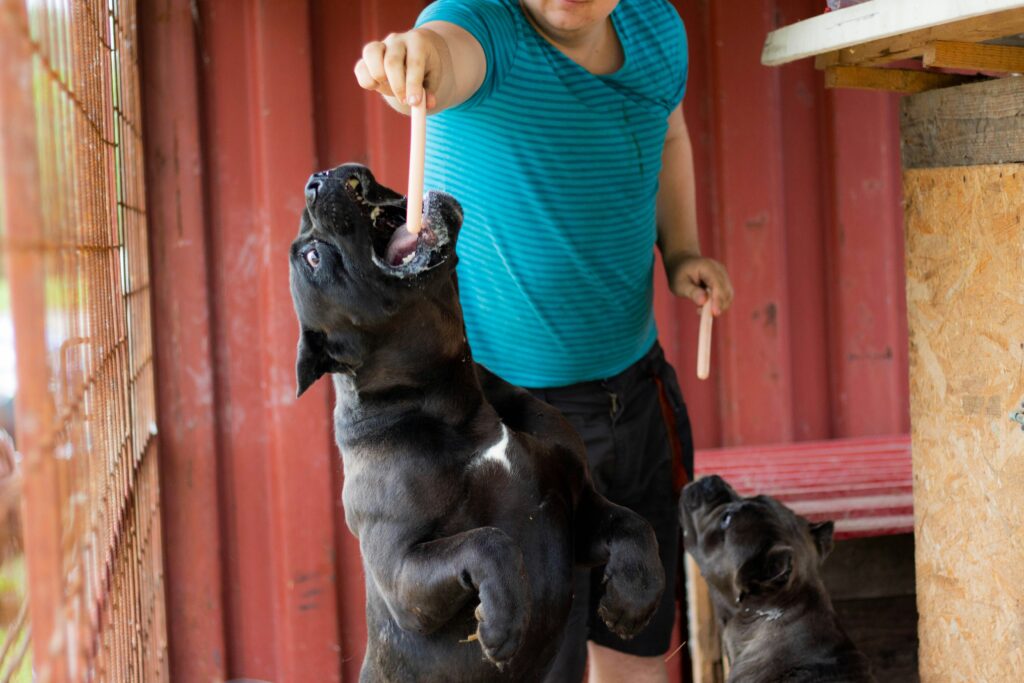
5. Cane Corso Temperament and Personality
Loyal and Protective
Cane Corsos form deep bonds with their families, making them excellent guardians. They are affectionate with loved ones and protective of their territory, showing natural wariness toward strangers.
Independent yet Loyal
While they are independent thinkers, Cane Corsos thrive in a family environment where they can receive consistent attention and training.
Example: If you have children, the Cane Corso can become a gentle giant with proper socialization, offering protection and loyalty.
Resource: Learn more about the breed’s temperament on American Kennel Club’s Cane Corso page.
6. Cane Corso Intelligence and Trainability
Highly intelligent and eager to please, Cane Corsos respond well to training, especially when using positive reinforcement. However, they need a confident handler who can provide consistent leadership.
Training Tips
- Early Training: Begin training from a young age to establish good behavior patterns.
- Use Rewards: Positive reinforcement with treats and praise helps build a trusting relationship.
- Avoid Harsh Corrections: They respond better to firm but gentle guidance.
Fun Fact
The Cane Corso is quick to learn commands, making it suitable for various dog sports and working roles.
Resource: Check out Positive Reinforcement Dog Training for more training tips.
7. Energy Levels and Exercise Needs
Cane Corsos are active dogs that require daily physical and mental stimulation. Without enough exercise, they may become bored, leading to unwanted behaviors.
Exercise Ideas
- Daily Walks: Aim for at least two 30-minute walks per day.
- Interactive Games: Games like fetch or tug-of-war are great for bonding and exercise.
- Obstacle Courses: Cane Corsos excel in agility training, which also keeps their mind sharp.
Seasonal Considerations
- Summer: Walk them early morning or late evening to avoid overheating.
- Winter: Ensure they’re comfortable in colder temperatures, as they have short coats.
8. Socialization Tips for Cane Corso Owners
Socialization is essential for Cane Corsos to prevent aggression or anxiety around unfamiliar people or animals.
Effective Socialization Techniques
- Puppy Classes: Enroll in socialization classes where they can interact with other dogs.
- Positive Experiences: Expose your Cane Corso to different environments, sounds, and people to build confidence.
Resource: Visit the American Society for the Prevention of Cruelty to Animals (ASPCA) for more on socialization techniques.
9. Nutrition and Dietary Requirements
Proper nutrition is key to keeping your Cane Corso healthy and energetic. Choose a high-quality diet rich in protein to support their muscular build and active lifestyle.
Feeding Tips
- Large Breed Formula: Look for a diet specifically designed for large breeds.
- Avoid Overfeeding: Cane Corsos are prone to obesity, so measure their food and avoid excessive treats.
- Consider Joint Supplements: These can support bone health as they age.
Example: Consult with a veterinarian to choose a diet tailored to your Cane Corso’s needs.
10. Grooming and Maintenance
The Cane Corso has a short, dense coat that requires minimal grooming, but regular upkeep is necessary to maintain their overall health.
Basic Grooming Routine
- Brushing: Brush weekly to remove loose fur and minimize shedding.
- Bathing: Bathe them once every few months or as needed.
- Nail Trimming: Keep their nails short to avoid discomfort or injury.
Resource: For grooming tips, visit PetMD’s Grooming Guide.
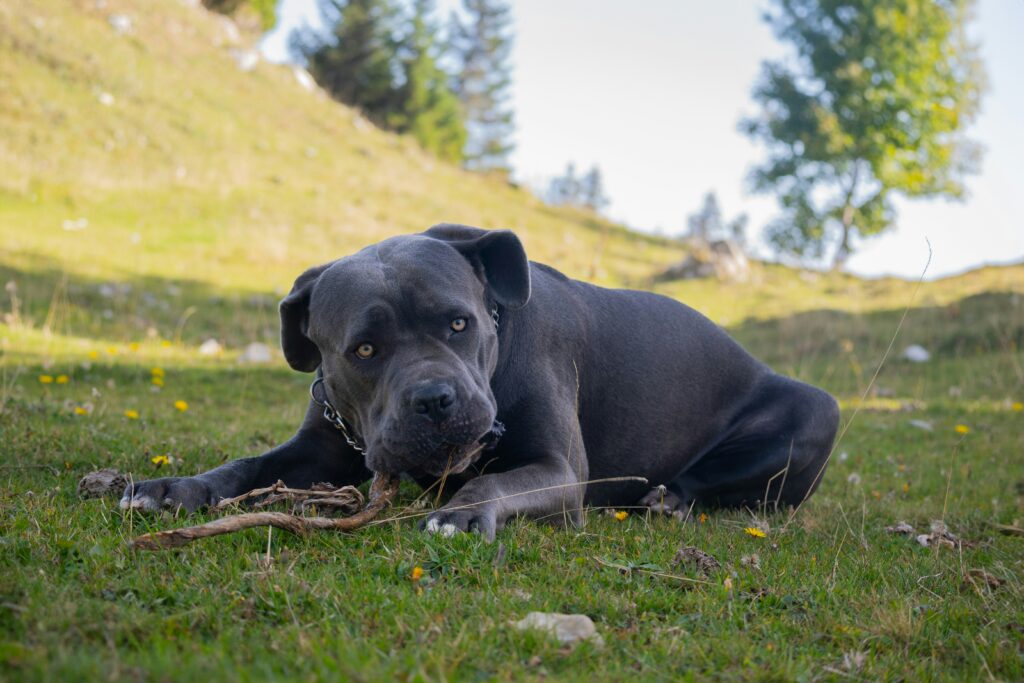
11. Health and Lifespan of the Cane Corso
The Cane Corso typically lives 10-12 years, but they are prone to certain health issues common in large breeds, including hip dysplasia, cardiac problems, and joint issues.
Health Maintenance Tips
- Regular Vet Check-ups: Annual exams can catch health issues early.
- Weight Management: Keeping a healthy weight minimizes stress on their joints.
- Exercise Caution in Puppies: Avoid high-impact activities until they’re fully grown to prevent joint problems.
Resource: Learn more about Cane Corso health on Vetstreet.
12. Frequently Asked Questions About Cane Corsos
1. Are Cane Corsos good family dogs?
While Cane Corsos can be wonderful family dogs, they require early socialization and training to ensure they interact well with children and other pets. It’s crucial to choose a reputable breeder and start training early.
Want to learn more about training your Cane Corso? Check out our guide on effective training techniques.
2. How big do Cane Corsos get?
Cane Corsos are large dogs. Males can reach heights of 26-28 inches and weigh 100-110 pounds, while females are slightly smaller.
Interested in learning about Cane Corso nutrition? Discover the best diet to keep your furry friend healthy and happy.
3. What is the Cane Corso’s temperament like?
Cane Corsos are known for their loyalty, intelligence, and protective instincts. They can be calm and affectionate with their families but can be wary of strangers. Early socialization is crucial to ensure they are well-adjusted and friendly.
Want to know how to socialize your Cane Corso? Our guide provides tips on building positive social interactions.
4. How much exercise does a Cane Corso need?
Cane Corsos are energetic dogs that require daily exercise to stay healthy and happy. A combination of physical activity, such as walking, running, or playing fetch, and mental stimulation, like puzzle toys or training sessions, is ideal.
Looking for fun ways to exercise your Cane Corso? Check out our list of engaging activities.
5. How often should I groom my Cane Corso?
Cane Corsos have a short, dense coat that requires minimal grooming. Weekly brushing is sufficient to remove loose hair and dirt. Regular nail trimming and ear cleaning are also important.
Want to learn more about Cane Corso grooming? Discover the best grooming practices to keep your dog looking and feeling their best.
6. Are Cane Corsos prone to any specific health problems?
Like many large breed dogs, Cane Corsos can be prone to certain health issues, such as hip and elbow dysplasia, bloat, and heart conditions. Regular veterinary check-ups and a healthy lifestyle can help minimize these risks.
Want to know how to keep your Cane Corso healthy? Learn about preventive measures and common health concerns.
7. How long is the lifespan of a Cane Corso?
The average lifespan of a Cane Corso is 10-12 years. Proper care, a balanced diet, and regular veterinary check-ups can help extend their lifespan.
8. Are Cane Corsos good with other pets?
With proper socialization, Cane Corsos can get along well with other pets, especially if they are raised together. However, it’s important to supervise interactions, especially with smaller animals.
9. How much does a Cane Corso puppy cost?
The cost of a Cane Corso puppy can vary depending on the breeder, bloodline, and specific characteristics. It’s essential to research reputable breeders and be prepared to invest in a quality puppy.
10. What is the best way to train a Cane Corso?
Positive reinforcement techniques, such as reward-based training, are the most effective way to train a Cane Corso. Consistency, patience, and positive reinforcement are key.
13. Conclusion: Is the Cane Corso Right for You?
As we conclude our exploration of the Cane Corso, it’s evident that this breed is a remarkable fusion of strength, elegance, and affection. Their unwavering loyalty, coupled with their protective instincts, makes them exceptional companions for families and individuals alike.
However, it’s important to remember that owning a Cane Corso is a significant responsibility. Early socialization, consistent training, and a balanced diet are crucial for their well-being and happiness. Additionally, regular veterinary check-ups and preventive care are essential to maintain their health.
With the right care and attention, a Cane Corso can be a joy to own. They are capable of forming deep bonds with their human family members and can be a source of unwavering love and companionship.
We hope this guide has provided you with valuable insights into the world of Cane Corsos. If you have any further questions or would like to share your experiences with this breed, please feel free to leave a comment below.
Thank you for joining us on this journey!


